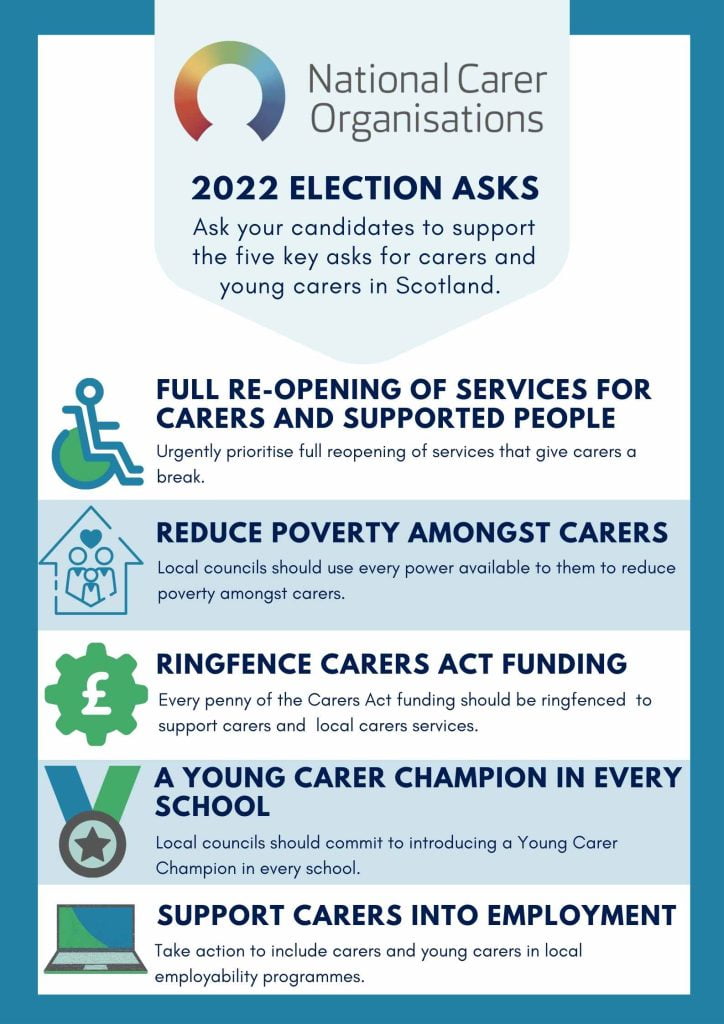
Campaigns page
This page will be updated with carer campaigns that you can get involved in.
Local Government Elections 2022
The national carer organisations have set out 5 priority areas we are asking candidates and local parties in the elections on 5 May 2022 to commit to pursuing. These are taken from our manifesto, which you can download below, and ongoing issues raised by carers and young carers since then.
3 in 5 of us will become carers at some point in our lives. Local councils have a key role to play in ensuring that carers are supported effectively and that taking on a caring role does not cause long term poverty, loss of employment, and damage to education, life choices and health and wellbeing of carers and young carers.

1. Full reopening of services for carers and supported people: Urgently prioritise full reopening of services that give carers a break.
In recent research, 7 in 10 unpaid carers who use day services have reduced or no access because of COVID-19 and a similar proportion have had no break from caring during the pandemic. This is having a significant impact on their health and wellbeing and their ability to remain in paid employment.
2. Reduce poverty amongst carers: Local councils should use every power available to them to reduce poverty amongst carers.
Carers are facing a cost of living crisis. The majority of carers have seen their energy bills increase and over half worry that oncoming increases in energy bills and other costs of living will negatively affect their own physical and mental health or that of the person they care for. To manage, 66% have cut back on heating and 17% have already fallen into arrears with their energy bills. 87% worry that they will not be able to heat their home to a safe level and many are worried they will have to use foodbanks to manage.
3. Ringfence Carers Act funding: Every penny of the Carers Act funding should be ringfenced to support carers and local carers services.
Throughout the pandemic, carer services have continued to provide ongoing advice, guidance, information, and support. They have done so and continue to do so as increasing numbers of unpaid carers come forward for support and the complexity of circumstances presented intensifies. And they’ve had to do even more, distributing PPE, providing information and support on vaccinations, distributing grants and resources, such as digital equipment to unpaid carers, and much more. All done at pace and often within existing staffing levels and within pre-pandemic capacity and funding limitations
4. A Young Carer Champion for every school: Local councils should commit to introducing a Young Carer Champion in every school
There are at least 29,000 young carers in Scotland, although many more are likely to be hidden. Research illuminates some of the impact the pandemic has had on young carers in Scotland. This report highlights the steep decline in mental health and wellbeing for young carers, increased feelings isolation, heightened concerns for their future, lack of opportunities to have a break and the negative impact on education.
5. Support carers into employment: Take action to include carers and young carers in local employability programmes.
More than 270,000 people in Scotland combine care with paid employment. Juggling work and caring responsibilities can be challenging and extremely stressful, and was already a challenge pre-pandemic, with an estimated 600 people a day giving up work to care.This leads to financial hardship for carers but also has an impact on businesses. Across the UK an estimated £8.2 billion could be gained economically, including by local economies, simply by more supportive working practices.
Manifesto for Unpaid Carers and Young Carers
The National Carer Organisations produced this manifesto in advance of the Scottish Parliament Election in May 2021. It reflects the key changes and concerns raised by many unpaid carers and young carers and sets out what we would like to see in the sixth Scottish Parliament term. We have also engaged with carer centres and young carers services across Scotland in developing this manifesto.
